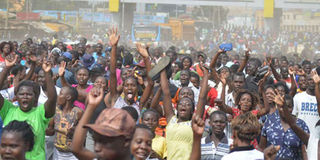How Kenya has become richer, more modern and deeply tribal

Kisumu residents celebrate soon after Nasa leader Raila Odinga was "sworn in" as the "People's President" at Uhuru Park in Nairobi on January 30, 2018. In Kenya, tribalism has been blamed for the deep cleavages. PHOTO | ONDARI OGEGA | NATION MEDIA GROUP
What you need to know:
- Kenyan radicals and nationalists admire people like Bildad Kaggia, but the factors that gave rise to a Kaggia are fewer today.
- The same forces of modernisation that have given us more knowledge have also contributed to making us political cavemen and women.
On Tuesday, Kenyan opposition leader Raila Odinga was "sworn in" as the “people’s president” at a big event at Uhuru Park, Nairobi.
There were not many people who would have bet that the government would allow the event to go ahead, and quite a few people who were surprised that Raila went ahead with it.
The swearing-in had its roots in the August 8 elections, in which the opposition hold that their man was robbed of victory.
Following a petition, the Supreme Court nullified the election.
SUPREME COURT
Raila then boycotted a second vote on October 26, which was won handily by President Uhuru Kenyatta.
Politics in Kenya over the last six months has not been for the faint of heart.
It has been dispiriting in its ugliness and divisiveness. But it has also had its fair of monumental surprises.
Apart from the Supreme Court overturning the first presidential election, though about five dozen people were killed in election-related violence, the country actually did not burn.
It’s not often that you light a match and put it so close to some lethal gas and it doesn’t go “kaboom”.
TRIBALISM
However, the events are also reason for deeper reflection about not just Kenya’s political crisis, but what they share with developments we are seeing elsewhere in Africa.
In the wider East Africa, we are witnessing ever deep polarisation in Uganda, Ethiopia, an already bad South Sudan keeps getting worse, the Democratic Republic of Congo has gone to the dogs, and Burundi is all but doomed.
In Kenya’s case, tribalism has been blamed for the deep cleavages.
What we are not told is why tribalism should has become so entrenched.
DIVERSITY
I think we need to cast our nets wider, especially if we consider that Kenya is not unique in mean politics.
It seems that our politics has got more parochial, for good reason – because we have progressed.
Consider a student anywhere in Africa who went to school in the 1950s and the 1970s.
There were few good schools, so to get a decent education many of them crisscrossed the country, often on foot, for several days.
Because most people were poor, and there was no middle class to speak of, to get an education you often had to live away from your rural home, with friends, priests, and kind strangers.
DISPARITIES
A young man or woman who walks from Kisumu to a school in Nairobi, and vice versa, encountering strangers who help instead of eating him or her along the way, can only be very different from one who flies or is driven there today.
In fact, today, you can study through to university, do your master’s degree, and not have to leave your district, in some parts of Kenya and other African countries.
Being born into a middle class home means that you can have your own room from the time you are weaned, until you leave your parents’ house, and throughout that period not even an extended family member will have lived in the home.
Even up to about 25 years ago, this was rare.
REFORMISTS
This is possible because we have got richer, education has expanded, the middle class has grown, families are changing and becoming smaller, so some people may want to help poorer relatives, but don’t have the poor relatives to shower their mercy upon.
The nationalist sensibilities that past generations learnt from hardships and the limitations of the time can be mastered with a lot harder work today.
Kenyan radicals and nationalists admire people like Bildad Kaggia, but the factors that gave rise to a Kaggia are fewer today.
You cannot speak to a fair-minded Tanzanian for 30 minutes without him or her relapsing into a cry for “another Julius Nyerere”.
But Tanzania is very different. You can get into a car in Mwanza, and wake up many hours and over 1,100 kilometres in Dar es Salaam, without having been woken up by a bump on the road.
MODERNISATION
When the Nyereres were little, you would grow old making that trip.
The view they had of Tanzania is hard to replicate today.
The same forces of modernisation that have given us more knowledge, better health and life expectancy, transported us into global citizens, have also contributed to making us political cavemen and women.
Fortunately, they also offer us the tools to overcome the new parochialism.
But first, we have to be smart enough to understand where it is all coming from.
The author is publisher of Africapedia.com and explainer site Roguechiefs.com. Twitter@cobbo3





